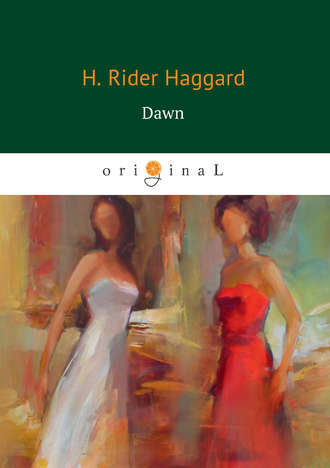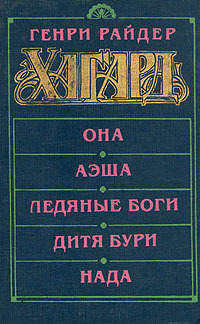
Полная версия
Dawn
When Philip shook off his cousin’s grasp and vanished towards the lake, he did so with bitter wrath and hatred in his heart, for he saw but too clearly that he had deeply injured himself in his father’s estimation, and, what was more, he felt that so much as he had sunk his side of the balance, by so much he had raised up that of George. He was inculpated; a Bellamy came upon the scene to save George, and, what was worse, an untruthful Bellamy; he was the aggressor, and George the meek in spirit with the soft answer that turneth away wrath. It was intolerable; he hated his father, he hated George. There was no justice in the world, and he had not wit to play rogue with such a one as his cousin. Appearances were always against him; he hated everybody.
And then he began to think that there was in the very next parish somebody whom he did not hate, but who, on the contrary, interested him, and was always ready to listen to his troubles, and he also became aware of the fact that whilst his mind had been thinking his legs had been walking, and that he was very near the abode of that person—almost at its gates, in short. He paused and looked at his watch; it had stopped at half-past eleven, the one blow that George had succeeded in planting upon him having landed on it, to the great detriment of both the watch and the striker’s knuckles; but the sun told him that it was about half-past twelve, not too early to call. So he opened the gate, and, advancing up an avenue of old beeches to a square, red- brick house of the time of Queen Anne, boldly rang the bell.
Was Miss Lee at home? Yes, Miss Lee was in the greenhouse; perhaps Mr. Philip would step into the garden, which Mr. Philip did accordingly.
"How do you do, Philip? I’m delighted to see you; you’ve just come in time to help in the slaughter.”
"Slaughter, slaughter of what—a pig?”
"No, green fly. I’m going to kill thousands.”
"You cruel girl.”
"I daresay it is cruel, but I don’t care. Grumps always said that I had no heart, and, so far as green fly are concerned, Grumps was certainly right. Now, just look at this lily. It is an auratum. I gave three-and-six (out of my own money) for that bulb last autumn, and now the bloom is not worth twopence, all through green fly. If I were a man I declare I should swear. Please swear for me, Philip. Go outside and do it, so that I mayn’t have it on my conscience. But now for vengeance. Oh, I say, I forgot, you know, I suppose. I ought to be looking very sorry—”
"Why, what’s the matter? Any one dead?”
"Oh, no, so much better than that. It’s got Grumps.”
"Got her, what has got her? What is ‘it’?”
"Why, Chancery, of course. I always call Chancery ‘it.’ I wouldn’t take its name in vain for worlds. I am too much afraid. I might be made to ‘show a cause why,’ and then be locked up for contempt, which frequently happens after you have tried to ‘show a cause.’ That is what has happened to Grumps. She is now showing a cause; shortly she will be locked up. When she comes out, if she ever does come out, I think that she will avoid wards in Chancery in future; she will have too much sympathy with them, and too much practical experience of their position.”
"But what on earth do you mean, Maria? What has happened to Miss Gregson?” (anglice Grumps).
"Well, you remember one of my guardians, or rather his wife, got ‘it’ to appoint her my chaperon, but my other guardian wanted to appoint somebody else, and after taking eighteen months to do it, he has moved the court to show that Grumps is not a ‘fit and proper person.’ The idea of calling Grumps improper. She nearly fainted at it, and swore that, whether she lived through it or whether she didn’t, she would never come within a mile of me or any other ward if she could help it, not even the ward of an hospital. I told her to be careful, or she would be ‘committing contempt,’ which frightened her so that she hardly spoke again till she left yesterday. Poor Grumps! I expect she is on bread and water now; but if she makes herself half as disagreeable to the Vice- Chancellor as she did to me, I don’t believe that they will keep her long. She’ll wear the gaolers out; she will wear the walls out; she will wear ‘it’ down to the bone; and then they will let her loose upon the world again. Why, there is the bell for lunch, and not a single green fly the less! Never mind, I will do for them to-morrow. How it would add to her sufferings in her lonely cell if she could see us going to a tete-a-tete lunch. Come on, Philip, come quick, or the cutlets will get cold, and I hate cold cutlets.” And off she tripped, followed by the laughing Philip, who, by the way, was now looking quite handsome again.
Maria Lee was not very pretty at her then age—just eighteen —but she was a perfect specimen of a young English country girl; fresh as a rose, and sound as a bell, and endowed besides with a quick wit and a ready sympathy. She was essentially one of that class of Englishwomen who make the English upper middle class what it is—one of the finest and soundest in the world. Philip, following her into the house, thought that she was charming; nor, being a Caresfoot, and therefore having a considerable eye to the main chance, did the fact of her being the heiress to fifteen hundred a year in land detract from her charms.
The cutlets were excellent, and Maria ate three, and was very comical about the departed Grumps; indeed, anybody not acquainted with the circumstances would have gathered that that excellent lady was to be shortly put to the question. Philip was not quite so merry; he was oppressed both by recollections of what had happened and apprehensions of what might happen.
"What is the matter, Philip?” she asked, when they had left the table to sit under the trees on the lawn. "I can see that something is the matter. Tell me all about it, Philip.”
And Philip told her what had happened that morning, laying bare all his heart-aches, and not even concealing his evil deeds. When he had done, she pondered awhile, tapping her little foot upon the turf.
"Philip,” she said at last, in quite a changed voice, "I do not think that you are being well treated. I do not think that your cousin means kindly by you, but—but I do not think that you have behaved rightly either. I don’t like that about the ten pounds; and I think that you should not have touched George; he is not so strong as you. Please try to do as your father —dear me, I am sure I don’t wonder that you are afraid of him; I am —tells you, and regain his affection, and make it up with George; and, if you get into any more troubles, come and tell me about them before you do anything foolish; for though, according to Grumps, I am silly enough, two heads are better than one.”
The tears stood in the lad’s brown eyes as he listened to her. He gulped them down, however, and said—
"You are awfully kind to me; you are the only friend I have. Sometimes I think that you are an angel.”
"Nonsense, Philip. If ‘it’ heard you talk like that, you would join Grumps. Don’t let me hear any more such stuff,” but, though she spoke sharply, somehow she did not look displeased.
"I must be off,” he said at length. "I promised to go with my father to see a new building on Reynold’s farm. I have only twenty minutes to get home;” and rising they went into the house through a French window opening on to the lawn.
In the dining-room he turned, and, after a moment’s hesitation, stuttered out—
"Maria, don’t be angry with me, but may I give you a kiss?”
She blushed vividly.
"How dare you suggest such a thing?—but—but as Grumps has gone, and there is no new Grumps to refer to, and therefore I can only consult my own wishes, perhaps if you really wish to, Philip, why, Philip, you may.”
And he did.
When he was gone she leant her head against the cold marble mantelpiece.
"I do love him,” she murmured, "yes, that I do.”
Chapter III
Philip was not very fond of taking walks with his father, since he found that in nine cases out of ten they afforded opportunities for inculcation of facts of the driest description with reference to estate management, or to the narration by his parent of little histories of which his conduct upon some recent occasion would adorn the moral. On this particular occasion the prospect was particularly unpleasant, for his father would, he was well aware, overflow with awful politeness, indeed, after the scene of the morning, it could not be otherwise. Oh, how much rather would he have spent that lovely afternoon with Maria Lee! Dear Maria, he would go and see her again the very next day.
When he arrived, some ten minutes after time in the antler-hung hall of the Abbey House, he found his father standing, watch in hand, exactly under the big clock, as though he was determined to make a note by double entry of every passing second.
"When I asked you to walk with me this afternoon, Philip, I, if my memory does not deceive me, was careful to say that I had no wish to interfere with any prior engagement. I was aware how little interest, compared to your cousin George, you take in the estate, and I had no wish to impose an uncongenial task. But, as you kindly volunteered to accompany me, I regret that you did not find it convenient to be punctual to the time you fixed. I have now waited for you for seventeen minutes, and let me tell you that at my time of life I cannot afford to lose seventeen minutes. May I ask what has delayed you?”
This long speech had given Philip the opportunity of recovering the breath that he had lost in running home. He replied promptly—
"I have been lunching with Miss Lee.”
"Oh, indeed, then I no longer wonder that you kept me waiting, and I must say that in this particular I commend your taste. Miss Lee is a young lady of good family, good manners, and good means. If her estate went with this property it would complete as pretty a five thousand acres of mixed soil as there is in the county. Those are beautiful old meadows of hers, beautiful. Perhaps—” but here the old man checked himself.
On leaving the house they had passed together down a walk called the tunnel walk, on account of the arching boughs of the lime-trees that interlaced themselves overhead. At the end of this avenue, and on the borders of the lake, there stood an enormous but still growing oak, known as Caresfoot’s Staff. It was the old squire’s favourite tree, and the best topped piece of timber for many miles round.
"I wonder,” said Philip, by way of making a little pleasant conversation, "why that tree was called Caresfoot’s Staff.”
"Your ignorance astonishes me, Philip, but I suppose that there are some people who can live for years in a place and yet imbibe nothing of its traditions. Perhaps you know that the monks were driven out of these ruins by Henry VIII. Well, on the spot where that tree now stands there grew a still greater oak, a giant tree, its trunk measured sixteen loads of timber; which had, as tradition said, been planted by the first prior of the Abbey when England was still Saxon. The night the monks left a great gale raged over England. It was in October, when the trees were full of leaf, and its fiercest gust tore the great oak from its roothold, and flung it into the lake. Look! do you see that rise in the sand, there, by the edge of the deep pool, in the eight foot water? That is there it is supposed to lie. Well, the whole country- side said that it was a sign that the monks had gone for ever from Bratham Abbey, and the country-side was right. But when your ancestor, old yeoman Caresfoot, bought this place and came to live here, in a year when there was a great black frost that set the waters of the lake like one of the new-fangled roads, he asked his neighbours, ay, and his labouring folk, to come and dine with him and drink to the success of his purchase. It was a proud day for him, and when dinner was done and they were all mellow with strong ale, he bade them step down to the borders of the lake, as he would have them be witness to a ceremony. When they reached the spot they saw a curious sight, for there on a strong dray, and dragged by Farmer Caresfoot’s six best horses, was an oak of fifty years’ growth coming across the ice, earth, roots and all.
"On that spot where it now stands there had been a great hole, ten feet deep by fourteen feet square, dug to receive it, and into that hole Caresfoot Staff was tilted and levered off the dray. And when it had been planted, and the frozen earth well trodden in, your grandfather in the ninth degree brought his guests back to the old banqueting-hall, and made a speech which, as it was the first and last he ever made, was long remembered in the country-side. It was, put into modern English, something like this:
"‘Neighbours,—Prior’s Oak has gone into the water, and folks said that it was for a sign that the monks would never come back to Bratham, and that it was the Lord’s wind that put it there. And, neighbours, as ye know, the broad Bratham lands and the fat marshes down by the brook passed by king’s grant to a man that knew not clay from loam, or layer from pasturage, and from him they passed by the Lord’s will to me, as I have asked you here to-day to celebrate. And now, neighbours, I have a mind, and though it seem to you but a childish thing, yet I have a mind, and have set myself to fulfil it. When I was yet a little lad, and drove the swine out to feed on the hill yonder, when the acorns had fallen, afore Farmer Gyrton’s father had gracious leave from the feoffees to put up the fence that doth now so sorely vex us, I found one day a great acorn, as big as a dow’s egg, and of a rich and wondrous brown, and this acorn I bore home and planted in kind earth in the corner of my dad’s garden, thinking that it would grow, and that one day I would hew its growth and use it for a staff. Now that was fifty long years ago, lads, and there where grew Prior’s Oak, there, neighbours, I have set my Staff to-day. The monks have told us how in Israel every man planted his fig and his vine. For the fig I know not rightly what that is; but for the vine, I will plant no creeping, clinging vine, but a hearty English oak, that, if they do but give it good room to breathe in, and save their heirloom from the axe, shall cast shade and grow acorns, and burst into leaf in the spring and grow naked in the winter, when ten generations of our children, and our children’s children, shall have mixed their dust with ours yonder in the graveyard. And now, neighbours, I have talked too long, though I am better at doing than talking; but ye will even forgive me, for I will not talk to you again, though on this the great day of my life I was minded to speak. But I will bid you every man pledge a health to the Caresfoot’s Staff, and ask a prayer that, so long as it shall push its leaves, so long may the race of my loins be here to sit beneath its shade, and even mayhap when the corn is ripe and the moon is up, and their hearts grow soft towards the past, to talk with kinsman or with sweetheart of the old man who struck it in this kindly soil.’”
The old squire’s face grew tender as he told this legend of the forgotten dead, and Philip’s young imagination summoned up the strange old-world scene of the crowd of rustics gathered in the snow and frost round this very tree.
"Philip,” said his father, suddenly, "you will hold the yeoman’s Staff one day; be like it of an oaken English heart, and you will defy wind and weather as it has done, and as your forbears have done. Come, we must go on.”
"By the way, Philip,” he continued, after a while, "you will remember what I said to you this morning—I hope that you will remember it, though I spoke in anger—never try to deceive me again, or you will regret it. And now I have something to say to you. I wish you to go to college and receive an education that will fit you to hold the position you must in the course of Nature one day fill in the county. The Oxford term begins in a few days, and you have for some years been entered at Magdalen College. I do not expect you to be a scholar, but I do expect you to brush off your rough ways and your local ideas, and to learn to become such a person both in your conduct and your mind as a gentleman of your station should be.”
"Is George to go to college too?”
"No; I have spoken to him on the subject, and he does not wish it. He says very wisely that, with his small prospects, he would rather spend the time in learning how to earn his living. So he is going to be articled to the Roxham lawyers, Foster and Son, or rather Foster and Bellamy, for young Bellamy, who is a lawyer by profession, came here this morning, not to speak about you, but on a message from the firm to say that he is now a junior partner, and that they will be very happy to take George as an articled clerk. He is a hard- working, shrewd young man, and it will be a great advantage to George to have his advice and example before him.”
Philip assented, and went on in silence, reflecting on the curious change in his immediate prospects that this walk had brought to light. He was much rejoiced at the prospect of losing sight of George for a while, and was sufficiently intelligent to appreciate the advantages, social and mental, that the University would offer him; but it struck him that there were two things which he did not like about the scheme. The first of these was, that whilst he was pursuing his academical studies, George would practically be left on the spot—for Roxham was only six miles off—to put in motion any schemes he might have devised; and Philip was sure that he had devised schemes. And the second, that Oxford was a long way from Maria Lee. However, he kept his objections to himself. In due course they reached the buildings they had set out to examine, and the old squire, having settled what was to be done, and what was to be left undone, with characteristic promptitude and shrewdness, they turned homewards.
In passing through the shrubberies, on their way back to the house, they suddenly came upon a stolid-looking lad of about fifteen, emerging from a side- walk with a nest full of young blackbirds in his hand. Now, if there was one thing in this world more calculated than another to rouse the most objectionable traits of the old squire’s character into rapid action, it was the discovery of boys, and more especially bird-nesting boys, in his plantations. In the first place, he hated trespassers; and in the second, it was one of his simple pleasures to walk in the early morning and listen to the singing of the birds that swarmed around. Accordingly, at the obnoxious sight he stopped suddenly, and, drawing himself up to his full height, addressed the trembling youth in his sweetest voice.
"Your name is, I believe—Brady—Jim Brady— correct me if I am wrong—and you have come here, you—you —young—villain—to steal my birds.”
The frightened boy walked slowly backwards, followed by the old man with his fiery eyes fixed upon his face, till at last concussion against the trunk of a great tree prevented further retreat. Here he stood for about thirty seconds, writhing under the glance that seemed to pierce him through and through, till at last he could stand it no longer, but flung himself on the ground, roaring:
"Oh! don’t ee, squire; don’t ee now look at me with that ‘ere eye. Take and thrash me, squire, but don’t ee fix me so! I hayn’t had no more nor twenty this year, and a nest of spinxes, and Tom Smith he’s had fifty-two and a young owl. Oh! oh!”
Enraged beyond measure at this last piece of information, Mr. Caresfoot took his victim at his word, and, ceasing his ocular experiments, laid into the less honourable portion of his form with the gold-headed malacca cane in a way that astonished the prostrate Jim, though he was afterwards heard to declare that the squire’s cane "warn’t not nothing compared with the squire’s eye, which wore a hot coal, it wore, and frizzled your innards as sich.”
When Jim Brady had departed, never to return again, and the old man had recovered his usual suavity of manner, he remarked to his son:
"There is some curious property in the human eye; a property that is, I believe, very much developed in my own. Did you observe the effect of my glance upon that boy? I was trying an experiment on him. I remember it was always the same with your poor mother. She could never bear me to look at her.”
Philip made no reply, but he thought that, if she had been the object of experiments of that nature, it was not very wonderful.
Shortly after their return home he received a note from Miss Lee. It ran thus:
"My dear Philip,
"What do you think? Just after you had gone away, I got by the mid- day post, which Jones (the butcher) brought from Roxham, several letters, amongst them one from Grumps and one from Uncle Tom. Grumps has shown a cause. Why? ‘It’ said she was not an improper person; but, for all that, she is so angry with Uncle Tom that she will not come back, but has accepted an offer to go to Canada as companion to a lady; so farewell Grumps.
"Now for Uncle Tom. ‘It’ suggested that I should live with some of my relations till I came of age, and pay them four hundred a year, which I think a good deal. I am sure it can’t cost four hundred a year to feed me, though I have such an appetite. I had no idea they were all so fond of me before; they all want me to come and live with them, except Aunt Chambers, who, you know, lives in Jersey. Uncle Tom says in his letter that he shall be glad if his daughters can have the advantage of my example, and of studying my polished manners (just fancy my polished manners; and I know, because little Tom, who is a brick, told me, that only last year he heard his father tell Emily —that’s the eldest—that I was a dowdy, snub-nosed, ill-mannered miss, but that she must keep in with me and flatter me up). No, I will not live with Uncle Tom, and I will tell ‘it’ so. If I must leave my home, I will go to Aunt Chambers at Jersey. Jersey is a beautiful place for flowers, and one learns French there without the trouble of learning it; and I like Aunt Chambers, and she has no children, and nothing but the memory of a dear departed. But I don’t like leaving home, and feel very much inclined to cry. Hang the Court of Chancery, and Uncle Tom and his interference too! —there. I suppose you can’t find time to come over to-morrow morning to see me off? Good-bye, dear Philip,
"Your affectionate friend, "Maria Lee.”
Philip did manage to find time next morning, and came back looking very disconsolate.
Chapter IV
Philip went to college in due course, and George departed to learn his business as a lawyer in Roxham, but it will not be necessary for us to enter into the details of their respective careers during this period of their lives.
At college Philip did fairly well, and, being a Caresfoot, did not run into debt. He was, as his great bodily strength gave promise of, a first-class athlete, and for two years stroked the Magdalen boat. Nor did he altogether neglect his books, but his reading was of a desultory and out-of-the-way order, and much directed towards the investigation of mystical subjects. Fairly well liked amongst the men with whom he mixed, he could hardly be called popular; his temperament was too uncertain for that. At times he was the gayest of the gay, and then when the fit took him he would be plunged into a state of gloomy depression that might last for days. His companions, to whom his mystical studies were a favourite jest, were wont to assert that on these occasions he was preparing for a visit from his familiar, but the joke was one that he never could be prevailed upon to appreciate. The fact of the matter was that these fits of gloom were constitutional with him, and very possibly had their origin in the state of his mother’s mind before his birth, when her whole thoughts were coloured by her morbid and fanciful terror of her husband, and her frantic anxiety to conciliate him.
During the three years that he spent at college, Philip saw but little of George, since, when he happened to be down at Bratham, which was not often, for he spent most of his vacations abroad, George avoided coming there as much as possible. Indeed, there was a tacit agreement between the two young men that they would see as little of each other as might be convenient. But, though he did not see much of him himself, Philip was none the less aware that George’s influence over his father was, if anything, on the increase. The old squire’s letters were full of him and of the admirable way in which he managed the estate, for it was now practically in his hands. Indeed, to his surprise and somewhat to his disgust, he found that George began to be spoken of indifferently with himself as the "young squire.” Long before his college days had come to an end Philip had determined that he would do his best, as soon as opportunity offered, to reduce his cousin to his proper place, not by the violent means to which he had resorted in other days, but rather by showing himself to be equally capable, equally assiduous, and equally respectful and affectionate.









